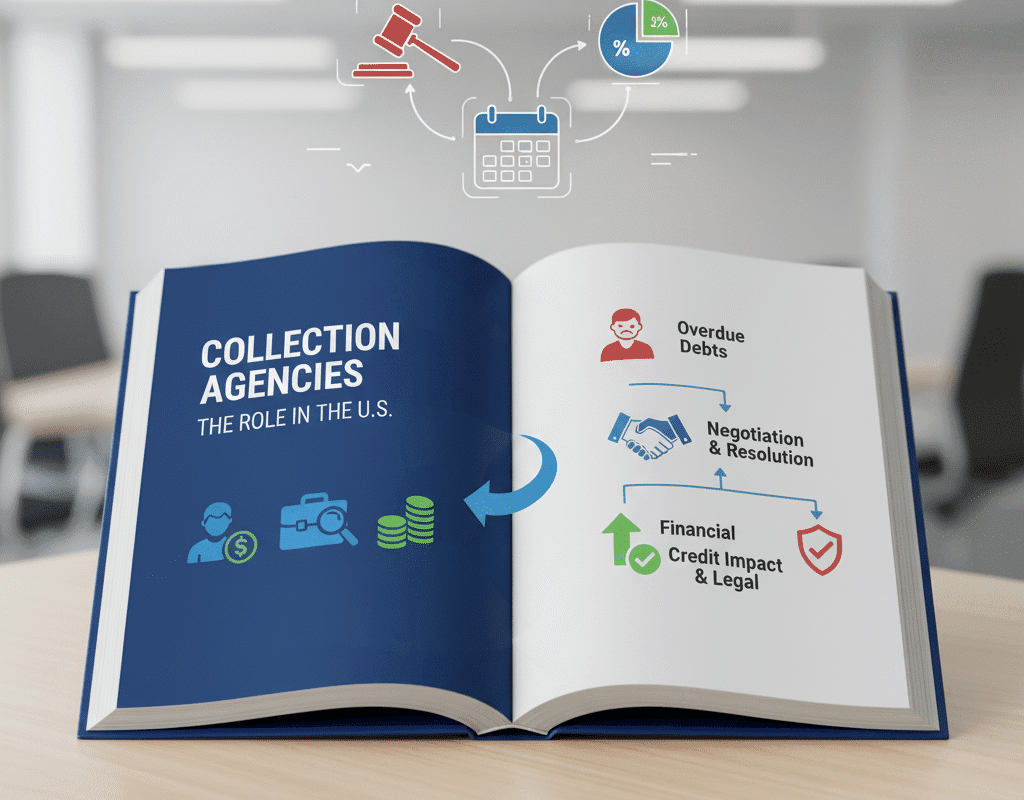The Vital Role of Collection Agencies in the U.S.
The Vital Role of Collection Agencies in the U.S.
A vital but frequently misunderstood part of the intricate ecosystem of the American financial system is played by collection agencies. These organizations operate at the nexus of legitimacy, regulation, and economic flow, assisting companies in recovering past-due payments and managing consumer rights.
The following topics are covered in this article: what collection agencies are, how they work, why they are important to both individuals and corporations, the legal framework in which they operate, the trends and difficulties they encounter, and how both debtors and creditors can more successfully negotiate this landscape.
HSBC Cashback Credit Card 2025 – Benefits, Rewards & How to Apply?

Collection Agencies: What Are They?
A collection agency, sometimes known as a debt collection agency, is a company that lenders, service providers, or creditors use to collect money from clients or borrowers who have fallen behind on payments or are past due.
Typically, when a creditor has attempted internal collection efforts and those have failed—perhaps after 60 to 120 days of delinquency—they may choose to assign the account to a third‐party agency or sell the debt altogether.
These agencies then become the intermediary, engaging with the debtor, validating the debt, negotiating payment plans or settlements, potentially reporting to credit bureaus, and in some cases initiating legal action.
The Reasons Companies Employ Collection Agencies
Unpaid accounts can result in cash flow issues, balance sheet stress, and the diversion of internal resources for a creditor, be it a bank, utility, store, or medical provider. Collection agencies offer a number of benefits.
Efficiency of Resources
It can be expensive to manage past-due accounts, particularly if the debtor is unresponsive. By contracting with an agency, internal teams can concentrate on ongoing business activities, while knowledgeable experts take care of delinquencies.
Specialized procedures and expertise
Legal expertise, negotiation skills, skip-tracing capabilities (finding debtors who have relocated or changed their contact information), established procedures, and experience with disputes or validation requests are all common among collection companies.
Risk Mitigation & Financial Recovery
By recovering funds that might otherwise be written off as bad debt, agencies can assist in preserving or improving business financial health. Some agencies work on contingency—meaning they only collect a fee if they recover funds—making the cost of using them more aligned with performance.
How American Collection Agencies Work.
Knowing the operational procedure makes it easier to understand what occurs when an account is past due.
Selling or Assigning the Debt
- Assignment/Contingency Model: The agency is tasked by the creditor with collecting the past-due account, and if successful, it receives a certain commission.
- Debt Buyers: In certain situations, debts are sold to agencies or buyers who subsequently collect on their own behalf, frequently for a small portion of the original sum owing.
Communication & Verification
The agency must authenticate the debt before starting collection operations. This includes confirming that the debtor is who they say they are, that the amount is correct, and that the original creditor is correct.
Framework for Law and Regulation
Numerous federal and state regulations in the United States regulate collection companies in order to safeguard customers and guarantee ethical business operations.
The FDCPA, or Fair Debt Collection Practices Act
When collecting consumer debts (i.e., personal, family, or household debts), third-party debt collectors are subject to the federal Fair Debt Collection Practices Act.
Important safeguards consist of:
- Prohibiting contacting debtors at inconvenient times (before 8 a.m. or after 9 p.m.), or at their workplace if known to be prohibited.
- Requiring an initial validation notice within five days of first contact explaining the debt and the debtor’s right to dispute it.
- Prohibiting deceptive, harassing, or unfair practices (false representation, threats of arrest, public shaming) in collection efforts.
State legislation
In addition to the federal minimum protections, many states have “mini-FDCPA” regulations, licensing or bonding requirements for debt collectors, and other protections.
Compliance and Licensing
Collection agencies must register, maintain proper documentation, and operate transparently. Non-compliance can lead to enforcement by agencies like the Federal Trade Commission (FTC) or state attorneys general.
The Economic and Social Role of Collection Agencies
While collection agencies may carry a negative stigma, their role in the broader economy is multi‐faceted.
Supporting Business Viability & Credit Availability
By recovering debts that might otherwise be lost, these agencies help companies stabilize cash flow, which in turn supports business operations, employee wages, investment and credit extension.
Moreover, recovering bad debt reduces overall credit losses in the economy, which can help lower interest rates and risk premiums for other borrowers.
Enabling Efficient Debt Management
Instead of every business reinventing the wheel, collection agencies bring specialised infrastructures of contact management, legal oversight and debtor analytics—improving overall efficiency of receivable recovery.
Effect on Customers
Placing an account into collections frequently serves as a strong inducement for the consumer to make a payment or reach a settlement. But there are serious repercussions as well: stress, possible legal action, and harm to credit scores. For a lot of people, this is the critical time when negotiating or getting expert financial help becomes essential.
Social and Ethical Aspects to Consider
Because the line between legitimate collection and harassment can be thin, ethical practices matter. Agencies that operate responsibly treat debtors fairly, offer realistic payment plans, and respect legal rights. When abuses occur, public trust is undermined, and the entire sector can suffer reputational damage.
Looking Ahead: What’s in Store for the Future
Growing usage of technology
In order to customize strategies, we’ll probably see increased automation, predictive analytics, digital communication channels (chatbots, secure portals), and improved debtor segmentation.
Increased enforcement of regulations
With consumer protection gathering momentum, collection agencies must continue to refine policies, invest in compliance training and adopt transparency as a core value.
Shift in debt portfolios
As new types of debt (e.g., medical, student-loan, gig-economy income shortfall) grow, collection agencies may evolve specialised units and practices.
Focus on ethical models
Agencies that emphasise negotiation, repayment help and respectful treatment may win trust, reduce litigation risk and achieve better long‐term outcomes.
In conclusion: The Vital Role of Collection Agencies in the U.S.
Collection agencies are an indispensable but often under-appreciated part of the U.S. financial landscape. They help creditors reclaim value, facilitate business continuity, and, when done right, provide a structured path for debtors to fulfil obligations. At the same time, the legal and regulatory framework ensures protections for consumers, balancing the power dynamics inherent in debt recovery.
For businesses, the decision to outsource to a collection agency should be thoughtful—based on performance, compliance and communication. For consumers, understanding your rights, responding proactively and engaging in negotiation can transform what might feel like a punitive process into an opportunity for resolution.
Why Some U.S. Banks Are “Too Big to Fail”: Risks, History, and Impact on America’s Economy
Why Some U.S. Banks Are “Too Big to Fail”: Risks, History, and Impact on America’s Economy
